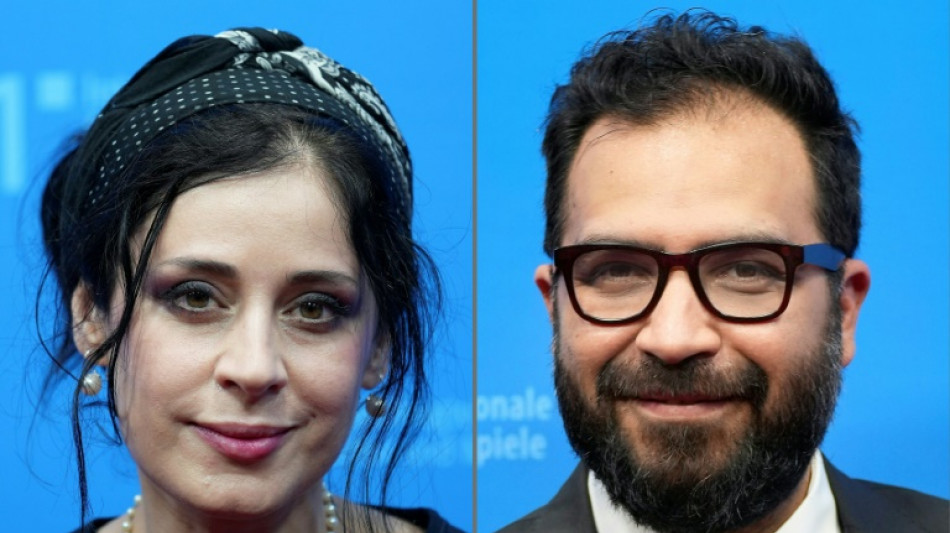
-
 Bangladesh's Tarique Rahman poised to be PM as Islamists concede
Bangladesh's Tarique Rahman poised to be PM as Islamists concede
-
What does Greenland's mining industry look like?

-
 Greenland prepares next generation for mining future
Greenland prepares next generation for mining future
-
China top court says drivers responsible despite autonomous technology

-
 Sixers rookie Edgecombe leads 'Team Vince' to NBA Rising Stars crown
Sixers rookie Edgecombe leads 'Team Vince' to NBA Rising Stars crown
-
Rubio at Munich security meet to address Europeans rattled by Trump
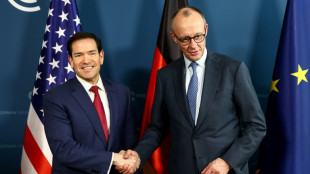
-
 Medal-winner Sato says Malinin paid for 'toxic schedule'
Medal-winner Sato says Malinin paid for 'toxic schedule'
-
Carney offers support of united Canada to town devastated by mass shooting

-
 All-in on AI: what TikTok creator ByteDance did next
All-in on AI: what TikTok creator ByteDance did next
-
Healthy Ohtani has Cy Young Award in sights

-
 One of Lima's top beaches to close Sunday over pollution
One of Lima's top beaches to close Sunday over pollution
-
'Nothing is impossible': Shaidorov shocks favourite Malinin to make history

-
 Malinin wilts at Olympics as Heraskevych loses ban appeal
Malinin wilts at Olympics as Heraskevych loses ban appeal
-
Bhatia joins Hisatsune in Pebble Beach lead as Fowler surges

-
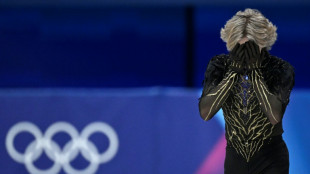 Malinin meltdown hands Shaidorov Olympic men's figure skating gold
Malinin meltdown hands Shaidorov Olympic men's figure skating gold
-
Top seed Fritz makes ATP Dallas semis with fantastic finish

-
 Patriots star receiver Diggs pleads not guilty to assault charges
Patriots star receiver Diggs pleads not guilty to assault charges
-
Havana refinery fire under control as Cuba battles fuel shortages

-
 Peru Congress to debate impeachment of interim president on Tuesday
Peru Congress to debate impeachment of interim president on Tuesday
-
Snowboard veteran James targets 2030 Games after Olympic heartbreak

-
 Costa Rica digs up mastodon, giant sloth bones in major archaeological find
Costa Rica digs up mastodon, giant sloth bones in major archaeological find
-
Trump says change of power in Iran would be 'best thing'

-
 Paris police shoot dead knife man at Arc de Triomphe
Paris police shoot dead knife man at Arc de Triomphe
-
Japan's Totsuka wins Olympic halfpipe thriller to deny James elusive gold

-
 Canada's PM due in mass shooting town as new details emerge
Canada's PM due in mass shooting town as new details emerge
-
Neto treble fires Chelsea's FA Cup rout of Hull

-
 Arbitrator rules NFL union 'report cards' must stay private
Arbitrator rules NFL union 'report cards' must stay private
-
Dortmund thump Mainz to close in on Bayern

-
 WHO sets out concerns over US vaccine trial in G.Bissau
WHO sets out concerns over US vaccine trial in G.Bissau
-
Skeleton racer Weston wins Olympic gold for Britain

-
 Ex-CNN anchor pleads not guilty to charges from US church protest
Ex-CNN anchor pleads not guilty to charges from US church protest
-
Berlin premiere for pic on jazz piano legend Bill Evans

-
 Fire at refinery in Havana as Cuba battles fuel shortages
Fire at refinery in Havana as Cuba battles fuel shortages
-
A Friday night concert in Kyiv to 'warm souls'

-
 PSG stunned by rampant Rennes, giving Lens chance to move top
PSG stunned by rampant Rennes, giving Lens chance to move top
-
Japan's Totsuka wins Olympic halfpipe thriller as James misses out on gold

-
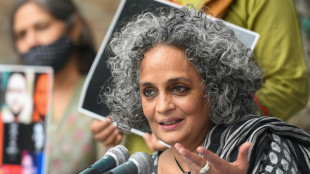 Indian writer Roy pulls out of Berlin Film Festival over Gaza row
Indian writer Roy pulls out of Berlin Film Festival over Gaza row
-
Conflicts turning on civilians, warns Red Cross chief
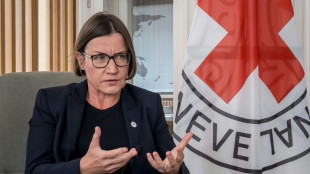
-
 Europe calls for US reset at security talks
Europe calls for US reset at security talks
-
Peru leader under investigation for influence peddling

-
 Rising star Mboko sets up Qatar Open final against Muchova
Rising star Mboko sets up Qatar Open final against Muchova
-
Canada PM to mourn with grieving town, new details emerge on shooter

-
 US waives Venezuela oil sanctions as Trump says expects to visit
US waives Venezuela oil sanctions as Trump says expects to visit
-
NBA star Chris Paul retires at age 40 after 21 seasons

-
 WTO chief urges China to shift on trade surplus
WTO chief urges China to shift on trade surplus
-
Vonn hoping to return to USA after fourth surgery on broken leg

-
 Trump sending second aircraft carrier to pile pressure on Iran
Trump sending second aircraft carrier to pile pressure on Iran
-
Heraskevych loses Olympics disqualification appeal, Malinin eyes second gold
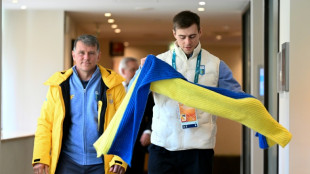
-
 Mercedes have 'taken a step back': Russell
Mercedes have 'taken a step back': Russell
-
Madagascar cyclone death toll rises to 40, water, power still out


Dissident directors hold up 'mirror' to Iranian women's desire
Two Iranian directors said they have been barred from travelling to the Berlin film festival for their new movie's premiere Friday for breaking one of their country's biggest taboos: showing a woman pursuing a "normal life".
Maryam Moghaddam and Behtash Sanaeeha told AFP from Tehran that they knew they were playing with fire with "My Favourite Cake", one of 20 films vying for the Golden Bear top prize.
Nevertheless the crackdown came as a shock last autumn.
"They raided our editor's place and took all the hard drives and computers of the project," Sanaeeha, 43, said by videolink, calling the last months "the most stressful time of our life".
"Then when we wanted to leave Tehran to go to Paris to finish the post-production, at the airport they took our passports."
Moghaddam, 52, said their crime was, with the film, "crossing so many red lines which have been forbidden in Iran for 45 years".
"It's about the woman living her life, who wants to have a normal life, which is forbidden for women in Iran."
- 'Plunging necklines' -
The bittersweet story spotlights 70-year-old Mahin, a retired nurse played by acclaimed culture journalist Lily Farhadpour.
After 30 years on her own following her husband's death, Mahin finds a man who catches her fancy while they are both dining alone at a pensioners' restaurant.
When she learns that the man, Faramarz, is a taxi driver, she books a ride with him and boldly sits next to him in the passenger seat.
They strike up a friendly rapport and are soon recalling their more permissive youth -- before the 1979 Islamic Revolution -- when drinking, dancing and "plunging necklines" were part of city life.
Mahin invites Faramarz to her home and, dodging the prying eyes of her neighbours, removes her hijab, pours two tall glasses of wine and pulls out her beloved "oldies" CDs.
"Showing a woman without her hijab is forbidden. But most women, even religious women, are without hijab at home," Moghaddam said.
"Drinking alcohol or dancing or meeting a partner -- everything happens in Iran, but inside the walls because it's forbidden outside. We wanted to be dedicated to reality and show it."
- 'Risk everything' -
The scenes mark "a new thing for Iranian cinema," she said, holding up a "mirror" to a way of life many still long for.
Sanaeeha noted that the case of Mahsa Amini, the young Iranian-Kurdish woman whose custody death sparked months of anti-government protests, came while the film was already in pre-production.
"We were depressed about the situation happening in our country," Sanaeeha said.
"But we talked, all the crew, and we explained (to) them what we are doing in this film -- it's about women, it's about life and it's about freedom. So it was our duty to finish this film."
In a harrowing scene, Mahin confronts officers from the Morality Police arresting young women for not properly covering their hair -- the same offence that put Amini in their crosshairs.
"You'd kill her over a few strands of hair," Mahin screams.
The late-in-life love story of Mahin and Faramarz feels revolutionary as they escape their deeply conservative society's strictures -- at least for one night.
"We wanted to tell a deeper story about life, about seizing the moment," Moghaddam said.
The Berlin film festival, which has long championed Iran's embattled directors, urged authorities to allow the filmmakers to travel. As has become customary, it will leave two seats empty for them at the premiere.
Moghaddam and Sanaeeha's previous film "Ballad of a White Cow", a drama about the death penalty, premiered at the 2021 Berlinale, as the event is known.
They said it has been banned since then in Iran but is available for downloads on European and US platforms.
"With the internet, you cannot censor the art so the film will come out" at home and abroad, Sanaeeh said.
However the stakes for independent filmmakers remain daunting.
"The punishments are so big," Moghaddam said. "You have to risk your career, your income, your everything."
F.Pedersen--AMWN
